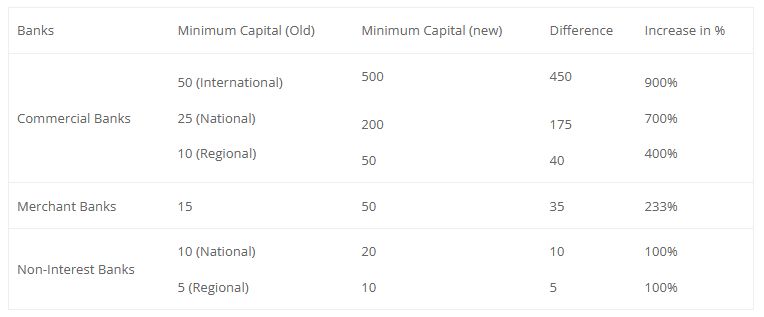On March 28, 2024, the Central Bank of Nigeria("CBN")issued a circularFPR/DIR/PUB/CIR/002/009on the review of the minimum capital requirements forcommercial, merchants, and non-interest banks("Banks"). This review comes in response to prevailing macroeconomic challenges and the need to enhance banks' resilience, solvency, and capacity to support the Nigerian economy.
New Minimum Capital Requirements
- Commercial Banks: International (N500 billion), National (N200 billion), and Regional (N50 billion)
- Merchant Banks: National (N50 billion)
- Non-Interest Banks: National (N20 billion) and Regional (N10 billion)
The table below provides a clear comparisonbetweenthe old and new minimum capital requirements for each bank category:

As the table shows, the new requirements represent a substantial increase compared to the previous levels, and inother tomeetthis revised capital requirement, the CBN has givenbanksa24-monthtime framestartingfromApril 1, 2024, to March 31, 2026. The CBNhasalso providedforvarious optionsin which banks can achieve the new minimum capital requirementincluding:
- Injecting fresh equity capital through private placements, rights issues, or subscriptions.
- Engaging in mergers and acquisitions (M&As).
- Upgrading or downgrading their license authorization.
Allbanks, existing and new applicants,are expected tosubmit an implementation plan to theDirector Banking Supervision Department,CBN byApril 30, 2024.This plan should detail the chosen options and timelines for achieving the new capital requirements.
It'salsoimportant to note thatforexisting banks, theminimum capital requirement shall comprise paid-up capital and share premium only,which shall not be based on shareholdersfund,andAdditional Tier 1 (AT1) Capitalshall not be eligible for meeting the new requirement.Notwithstanding the capital increase, banks are to ensurestrict compliance with the minimum capital adequacy ratio(CAR)requirement applicable to their license authorization.Banks that breach the Capital Adequacy Ratio (CAR) requirement shall be required to inject fresh capital to regularize their position.
However, fornew banks seeking licenses, the minimum capital requirement shall be paid-up capitalonlyThis requirement applies to all new banking license applications submitted afterApril 1, 2024. The CBN will also continue to process pending applications for banking licenses, with promoters required to make up the difference between the capital deposited and the new capital requirement byMarch 31, 2026.
Protection of Depositors
During theperiod of theimplementationof this new minimumcapitalrequirement,the CBN will work closely with the Nigeria Deposit Insurance Corporation("NDIC")to ensure the protection of depositors' interests. This collaboration is crucial in maintaining confidence in the banking system and safeguarding the funds of depositors.
Implications for Banks
- Strengthened Capital Base: Banks will need to raise additional capital, which could lead to improved capital adequacy ratios and stronger financial positions.
- Operational Adjustments: Banks may need to restructure their operations to accommodate the increased capital requirements, which could impact profitability and efficiency.
- Access to Credit: There is a possibility that banks may become more cautious in lending, as they strive to meet the new capital requirements, potentially affecting access to credit for businesses and individuals.
Implications for the Economy
- Improved Financial Stability: A stronger banking sector with higher capital requirements could contribute to overall financial stability in the economy.
- Increased Investor Confidence: The higher capital requirements may boost investor confidence in Nigerian banks, leading to increased investment in theeconomy.
- Enhanced Competitiveness: The new requirements may spur competition among banks, leading to improved efficiency and innovation in the sector.
- Potential Economic Growth: Strengthening the banking sector is crucial for economic growth, as banks play a key role in financing economic activities.
Conclusion
The CBN's decision to raise the minimum capital requirements for bankshighlightsits commitment to ensuring a sound and stable banking system in Nigeria. While the new requirements may pose initial challenges for banks, they are crucial for enhancing the sector's resilience and ability to support economic growth. By strengthening the banking sector, the CBN is laying a foundation for a more robust and sustainable financial system that can withstand future challenges and contribute to Nigeria's overall economic development.
The content of this article is intended to provide a general guide to the subject matter. Specialist advice should be sought about your specific circumstances.


